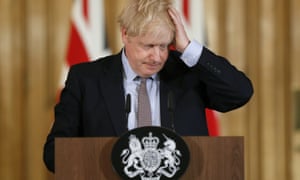Media criticise PM’s Covid strategy, as UK adopts job support scheme similar to Germany’s own

The UK followed in the footsteps of the German government by adopting a jobs support scheme on Thursday. The announcement came as German commentators spoke of their confusion at the zig-zag approach to tackling the coronavirus, describing a nation caught up in feelings of panic, disbelief and disillusionment.
“Military intervention to control coronavirus rules a possibility,” ran one banner headline in the business daily Handelsblatt this week, while an editorial in the Süddeutsche Zeitung was titled: “Johnson’s skittishness endangers his country.”
Brexit remains the dominant topic among those with an eye on UK affairs, but increasingly the current administration’s virus-fighting policies have been receiving more attention. For some, the two issues are intertwined. The main TV news recently said Johnson had “switched from being Mr Brexit to Mr U-turn”. The Wirtschaftswoche weekly business magazine said “one of the main reasons for the ongoing coronavirus chaos” in Britain was Johnson’s decision “to occupy lots of ministerial posts with Brexit hardliners”.
“The perplexity of the British public is rising,” wrote Thomas Kielinger, the veteran Britain watcher for the conservative Die Welt. “Its government appears to be stumbling through a forest of lunacy … and it’s dawning on many that Boris Johnsonis the wrong man to cope with an emergency.”
Kielinger calls the punishments for those who do not abide by the new stricter measures “draconian” and describes the disagreements over the scientific points of view on which the government has based its rules. “Johnson has unsettled the population with his zig-zag course … the consequence of his various about-turns is fatal: many people don’t take the rules seriously any more.”
“The British appear right now as if they’re trapped in a doubly paradoxical situation,” Kielinger concludes – of both coronavirus and Brexit. There is also fascination, though a lack of smugness, that in order to tackle the economic crisis the British government has “turned to Germany” (Wirtschaftswoche) and “copied our success model” (Die Welt), its Kurzarbeit (short-work) system.
“Measures that were previously unheard of in Britain – in addition to injecting business with cash, London is also paying a large portion of people’s wages,” according to Wirtschaftswoche. It pointed out the irony that Brexit-oriented Britain had effectively also copied a model (Sure) supported by the EU.

Kurzarbeit – according to which workers can be sent home or their hours significantly reduced, and the state will pick up a large portion of their lost income – has been around since the early 1900s. But it came into its own during the financial crisis of 2008-09 and is widely viewed as one of the main reasons for Germany’s speedy recovery, referred to by economists as one of the country’s most successful exports.
It has been imitated in various forms, first by Switzerland and more recently by Denmark, Sweden, Norway, Austria, Italy and Japan. The variant in France is the chômage partiel (partial unemployment) scheme, according to which laid-off workers receive state payments. In Spain it is the ERTE system, whereby workers who have been temporarily suspended are paid 70% of their wages as social security.
It might yet be a problem, according to Die Welt, “that the British model is less flexible and short-term than its German prototype”. It also acknowledges the worries of some Anglo-Saxon economists, “that if it’s too generous, it could encourage zombie companies … that only survive due to state support”.
• This article was amended on 25 September 2020 because an earlier version mistakenly translated France’s chômage partiel scheme, as “partial employment”. This has been corrected to partial unemployment.
